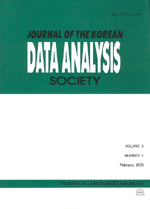사회자본이 갈등을 매개로 협력과 관계지속의도에 미치는 영향
The Effect of Social Capital on Cooperation and Relationship Continuity Intention via Conflict
- 한국자료분석학회
- Journal of The Korean Data Analysis Society (JKDAS)
- Vol.12 No.1
-
2010.02467 - 481 (15 pages)
- 42

본 연구는 부산지역에 소재하고 있는 프랜차이즈 가맹점들을 대상으로 가맹본부와의 관계에서 형성된 ‘유대강도’ 및 ‘상호신뢰’와 같은 사회자본이 상호갈등을 매개로 상호협력과 관계지속의도에 어떻게 영향을 미치는지에 대하여 실증적으로 조사하였다. 본 연구는 기존 연구들과 달리 사회자본과 그 결과변수들에 대하여 양방향적인 관점에서 접근하였다. 선행연구들을 토대로 9개의 가설을 설정되었으며, 공분산 구조방정식을 통하여 가설을 검증하였다. 그 결과 유대강도가 상호갈등에 영향을 미칠 것이라고 기대한 가설을 제외한 모든 가설들이 채택되었다. 본 연구의 결과는 사회자본과 관계성과 간의 관계에 상호갈등이 매개역할을 할 수 있다는 것을 보여주고 있다. 단 상호신뢰는 상호갈등에 직접적인 영향을 줄 수 있으나 유대강도는 상호갈등에 직접적인 영향을 주지 못하고 상호신뢰를 매개로 간접적으로 상호갈등에 영향을 미친다는 것을 보여주고 있다. 마지막으로 본 연구는 실증결과를 토대로 본 연구의 학문적ㆍ실무적 시사점을 제시하고 연구의 한계점들을 토대로 향후과제를 제안하고 있다.
This research investigated empirically the impact of social capital such as mutual trust on relationship performance such as mutual cooperation via mutual conflict using data of franchisees in Busan. Different from existing researches, the research was approached from the dyadic viewpoint. On the basis of existing researches, 9 hypotheses were developed and tested through a structural equation model. As results of the test, all 8 hypotheses were significantly supported as expected, except for the hypothesis that stronger tie strength leads to lower mutual conflict. The results show that mutual conflict plays a mediating role on the relationship between social capital and relationship performance, but that tie strength does not directly affect mutual conflict. Finally, the study suggests important implications both academically and practically and does several research limitations and future studies.
1. 서론
2. 이론적 배경
3. 연구방법
4. 실증분석 결과
5. 결론
참고문헌
(0)
(0)